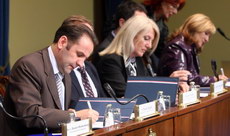- Serbia
Get to know Serbia
- Citizens
Culture and science
Health services
Pension and disability insurance
- Business
Employment
Economy
- Media
- Government
- Contact
Keep in touch
Contact form
Back
Keepin touch
Whether you have a question, comment, suggestion or any problem in the purview of the government, send us your message and we will try to respond as soon as possible. If your problem is not in our purview, we will forward your message to the relevant institution.
Q:
A:
Memorandums on implementing Social Care Development Strategy signed
Belgrade,
1 December 2008
Minister of Labour and Social Policy Rasim Ljajic today signed Memorandums on Cooperation with representatives of Belgrade, Nis, Novi Sad and Kragujevac as part of the project "Support to Implementing the Social Care Development Strategy", worth £3.5 million.
Ljajic told a press conference following the signing that the project aims to strengthen the capacities of the Ministry and local self-governments, primarily in the social care sector, adding that the Social Care Development Strategy is based on the decentralisation principle.
According to him the project is financed from a joint donation of the British government, through the Department for International Development and the Norwegian Ministry of Foreign Affairs.
He recalled that this is a three-year project whose implementation began in 2006 and was resumed last year, when 24 municipalities with strategic social care development projects were chosen for the programme.
He noted that €1.5 million was set aside for the first stage, adding that another €800,000 will be earmarked in the second stage, to finance 23 projects.
Ljajic explained that 12 of the projects concern day care centres for children with disabilities, seven day care centres for the elderly, three for victims of violence and one for children without parental care.
He also announced that the Social Economic Council will agree on the implementation of an expanded collective agreement at its next session, scheduled for the end of 2008.
He stressed that the interests of all social partners must be respected, adding that the Council will hold several sessions by the end of this year in order to find solutions and taking the current economic state into account.
Ljajic pointed out that it is necessary to monitor the global financial crisis, as the implementation of the collective agreement will be affected by its impact on Serbia.
British Ambassador to Serbia Stephen Wordsworth said that since 2001 the British government has allocated £30 million to Serbia.
Wordsworth pointed to the importance of the social care system reform in all countries, adding that the efficiency of any government can be assessed according to the social measures provided to their citizens.
Norwegian Ambassador to Serbia Haakon Blankenborg said that Norway sets aside between €20 and €24 million for Serbia on an annual basis, adding that one half of these funds is implemented in cooperation with the Serbian government.
According to him the project is financed from a joint donation of the British government, through the Department for International Development and the Norwegian Ministry of Foreign Affairs.
He recalled that this is a three-year project whose implementation began in 2006 and was resumed last year, when 24 municipalities with strategic social care development projects were chosen for the programme.
He noted that €1.5 million was set aside for the first stage, adding that another €800,000 will be earmarked in the second stage, to finance 23 projects.
Ljajic explained that 12 of the projects concern day care centres for children with disabilities, seven day care centres for the elderly, three for victims of violence and one for children without parental care.
He also announced that the Social Economic Council will agree on the implementation of an expanded collective agreement at its next session, scheduled for the end of 2008.
He stressed that the interests of all social partners must be respected, adding that the Council will hold several sessions by the end of this year in order to find solutions and taking the current economic state into account.
Ljajic pointed out that it is necessary to monitor the global financial crisis, as the implementation of the collective agreement will be affected by its impact on Serbia.
British Ambassador to Serbia Stephen Wordsworth said that since 2001 the British government has allocated £30 million to Serbia.
Wordsworth pointed to the importance of the social care system reform in all countries, adding that the efficiency of any government can be assessed according to the social measures provided to their citizens.
Norwegian Ambassador to Serbia Haakon Blankenborg said that Norway sets aside between €20 and €24 million for Serbia on an annual basis, adding that one half of these funds is implemented in cooperation with the Serbian government.
-
 Belgrade, 22 January 2025
Belgrade, 22 January 2025Egypt one of Serbia’s closest partners on international stage
-
 Belgrade, 9 July 2024
Belgrade, 9 July 2024Support for 104 associations in diaspora that preserve Serbian language, culture
-
 Belgrade, 15 April 2024
Belgrade, 15 April 2024Competition for StarTech grants open until 31 May
-
 Belgrade, 2 October 2023
Belgrade, 2 October 2023Serbia respects Resolution 1244 and will do everything to preserve peace
-
 Belgrade, 13 September 2023
Belgrade, 13 September 2023Day of Serbian Unity to be celebrated outside borders of Serbia, Republika Srpska for the first time
-
 Belgrade, 8 August 2023
Belgrade, 8 August 2023RSD 24.2m in state aid paid out to citizens affected by storm
-
 Belgrade, 17 June 2023
Belgrade, 17 June 2023Belgrade is doing everything to preserve peace in Kosovo and Metohija
-
 Belgrade, 15 June 2023
Belgrade, 15 June 2023Slovenia will continue to support Serbia on its way to EU
-
 Belgrade, 5 May 2023
Belgrade, 5 May 2023Emergency measures, tightening of conditions for possessing weapons
-
 Belgrade, 3 May 2023
Belgrade, 3 May 2023Three days of mourning in Serbia over tragedy at Vladislav Ribnikar primary school

